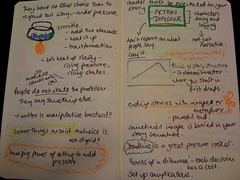There is plenty of writing advice about the first 10 pages, the importance of hooking the reader at the start and making an impact in the first paragraph. But what about making sure that the reader wants to buy your next book?
If your ending sucks, it can leave a bad taste in the reader’s mouth and will ensure they don’t want to read your next book. So here are some tips on writing endings for your …novels:
- Don’t cheat and suddenly have everything work out fine. This is lazy and the reader isn’t fooled. For example “And Jesus lived happily ever after”. From ‘How Not To Write A Novel.
- Link the story to a larger theme to end on a high note. This is one of the great tips included by C. Patrick Schulze in this article on writing endings.
- You can surprise the reader but you must also satisfy them. There should be more than one possible ending to a book, so the reader doesn’t just give up as they know what will happen. It’s worth foreshadowing this ending with hints in the rest of the book though so that they are surprised but it is not entirely out of the blue. Paraphrased from Holly Lisle. This is also covered by the disappointment of twist endings at Kim’s Craft Blog.
- Don’t use sappy extraneous contemplation. This is the big problem with the ending of Dan Brown’s ‘The Lost Symbol‘. The last chapter or two is just watching the sun rise and thinking about the experience. Boring and pointless.
- Some genres have an expected ending that you can’t mess with. If your genre is romance, they have to get together at the end. There’s no getting around this unless you want to change genres! You also need to keep some characters alive if you have a series of books planned.
- Don’t forget to end the book (or explain it is a trilogy!). I recently read ‘The Passage’ by Justin Cronin, a very chunky post-apocalyptic, majorly hyped novel. I enjoyed it but was hugely disappointing in the ending which basically didn’t end. There were so many loose ends so I went onto Twitter to see if anyone else felt the same way. A wonderful fellow tweeter pointed out that the book is first in a trilogy! However, this doesn’t excuse the feeling of disappointment as the brilliant ‘Hunger Games’ by Suzanne Collins is also the first in a trilogy and wraps the story up and yet still leads onto the next book. It’s definitely a balance.
- The resolution comes after the climax. The ending does not have to be in that last action/adventure scene. It needs to be after the climax so the story is rounded out. In film, “the audience can catch its breath, gather its thoughts and leave the cinema with dignity” From ‘Story’ by Robert McKee.
 The graph on the right shows the climax and then resolution – from my seminar notes!
The graph on the right shows the climax and then resolution – from my seminar notes!
Here are some of comments from Twitter – thanks to all who contributed!
- Make it satisfying. Doesn’t have to be good or happy, but readers want to be satisfied. @Kessbird
- Surprise the reader and definitely tie up the lose ends (I hate sub-plots that are just abandoned!) @graywave, author of ‘TimeSplash’
- Emotionally move the reader in some way to make her feel that her money was well-spent. @jchutchins , author of 7th Son thriller trilogy
- Think of the biggest, most mind-blowing final conflict you can. Then make it bigger.
 @AlanBaxter, author of ‘Realmshift’
@AlanBaxter, author of ‘Realmshift’
- I always start with the idea of where I am going, makes it so much easier to get there! @PhilippaJane , author of ‘Chasing the Bard’
- End on a note of anticipation. Leave with the reader wanting more. @teemonster , author of Billibub Baddings books
- “…and then the world exploded” @ShearersBooks
- Endings in a book must come natural, but “out of the box” at the same time. @myotherhand
- Write the ending out fully that comes to mind. Then try cutting the last line or paragraph. It’s often an improvement. @vickigundrum
- Ending depends on the beginning. in my two novels i have chosen unhappy ending and the third one a happy ending. @sudampanigrahi
- End with a question to encourage comments.
 @code_and_prose
@code_and_prose
- Always go back to your opening point. @smuttysteff
- Figure it out before you write the beginning! @ChrisMorphew
This is a reprint from Joanna Penn‘s The Creative Penn.
